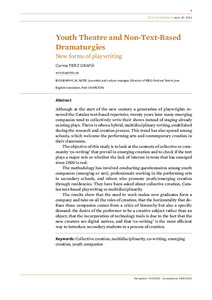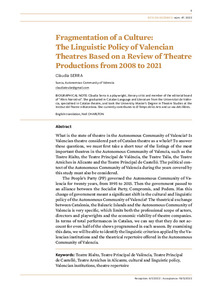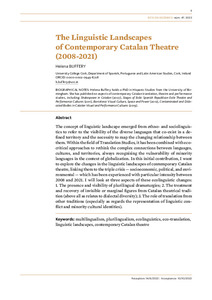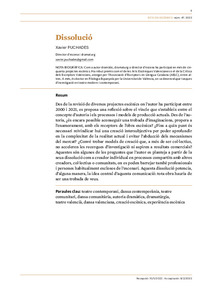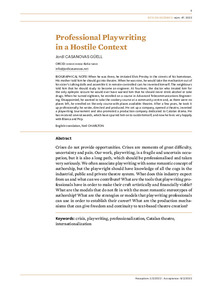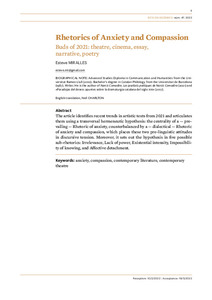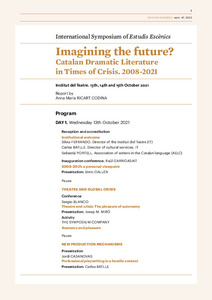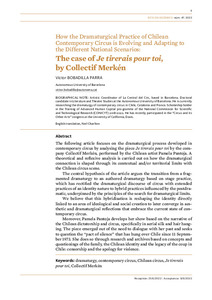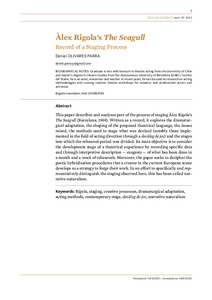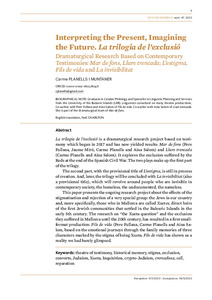Search
Now showing items 1-10 of 18
Teatre jove i dramatúrgies no textuals. Noves formes d'escriptura dramàtica
Article
Estudis escènics: quaderns de l'Institut del Teatre. 2022, Núm. 47
Open Access
<p>Si, a l’inici del nou segle, una generació de dramaturgs va renovar el repertori textual català, vint anys després, moltes companyies emergents tendeixen a escriure col·lectivament els seus espectacles en comptes de posar en escena textos ja existents. La seva és, sovint, una escriptura híbrida, multidisciplinà· ria, generada durant el procés d’investigació i de creació. La tendència s’ha estès també entre els centres educatius que fan entrar a les aules les arts es· cèniques i la creació contemporània a les aules.</p><p>L’objectiu d’aquest estudi és observar els contextos de ‘coescriptura’, col· lectiva o comunitària, predominants en la creació emergent. Comprovar si el text hi té pes o si el desinterès pels textos sorgits després del 2000 és o no real. La metodologia ha consistit a realitzar enquestes a companyies joves (emergents i no), a professionals que treballen les arts escèniques als instituts i a altres que potencien la creació jove/ emergent a través de residències. Se’ls ha consultat sobre creació col·lectiva, l’obra dramàtica textual catalana o la multidisciplinarietat.</p><p>Els resultats acrediten que la necessitat de treballar empeny els nous graduats a formar companyia i assumir tots els rols de la creació; que l’horitzontalitat que defineix aquestes companyies deriva d’una crisi de jerarquia, però també d’una demanda concreta: l’anhel de l’intèrpret de ser subjecte creatiu, i no objecte; que la incorporació d’eines tecnològiques respon al fet que els nous creadors són natius digitals, i que la ‘coescriptura’ és la manera més eficaç d’introduir l’alumnat de secundària i batxillerat en un procés de creació. <strong> </strong></p>...
<p>Although at the start of the new century a generation of playwrights renewed the Catalan text-based repertoire, twenty years later many emerging companies tend to collectively write their shows instead of staging already existing plays. Theirs is often a hybrid, multidisciplinary writing, established during the research and creation process. This trend has also spread among schools, which welcome the performing arts and contemporary creation in their classrooms.</p><p>The objective of this study is to look at the contexts of collective or community ‘co-writing’ that prevail in emerging creation and to check if the text plays a major role or whether the lack of interest in texts that has emerged since 2000 is real.</p><p>The methodology has involved conducting questionnaires among youth companies (emerging or not), professionals working in the performing arts in secondary schools, and others who promote youth/emerging creation through residencies. They have been asked about collective creation, Catalan text-based playwriting or multidisciplinarity.</p><p>The results show that the need to work makes new graduates form a company and take on all the roles of creation; that the horizontality that defines these companies comes from a crisis of hierarchy but also a specific demand: the desire of the performer to be a creative subject rather than an object; that the incorporation of technology tools is due to the fact that the new creators are digital natives, and that ‘co-writing’ is the most efficient way to introduce secondary students to a process of creation.</p>...
<p>Although at the start of the new century a generation of playwrights renewed the Catalan text-based repertoire, twenty years later many emerging companies tend to collectively write their shows instead of staging already existing plays. Theirs is often a hybrid, multidisciplinary writing, established during the research and creation process. This trend has also spread among schools, which welcome the performing arts and contemporary creation in their classrooms.</p><p>The objective of this study is to look at the contexts of collective or community ‘co-writing’ that prevail in emerging creation and to check if the text plays a major role or whether the lack of interest in texts that has emerged since 2000 is real.</p><p>The methodology has involved conducting questionnaires among youth companies (emerging or not), professionals working in the performing arts in secondary schools, and others who promote youth/emerging creation through residencies. They have been asked about collective creation, Catalan text-based playwriting or multidisciplinarity.</p><p>The results show that the need to work makes new graduates form a company and take on all the roles of creation; that the horizontality that defines these companies comes from a crisis of hierarchy but also a specific demand: the desire of the performer to be a creative subject rather than an object; that the incorporation of technology tools is due to the fact that the new creators are digital natives, and that ‘co-writing’ is the most efficient way to introduce secondary students to a process of creation.</p>...
Fragmentació d’una cultura: la política lingüística dels teatres valencians a partir d’un repàs de les produccions teatrals des del 2008 fins al 2021
Article
Estudis escènics: quaderns de l'Institut del Teatre. 2022, Núm. 47
Open Access
<p>Quina és la situació del teatre en català al País Valencià? Es considera que el teatre valencià forma part del conjunt del teatre català? Per respondre aquestes preguntes caldrà fer abans un breu recorregut per les ...
Els paisatges lingüístics del teatre català contemporani (2008-2021)
Article
Estudis escènics: quaderns de l'Institut del Teatre. 2022, Núm. 47
Open Access
<p>El concepte de paisatge lingüístic prové de l’etnolingüística i la sociolingüística per referir-se a la visibilitat de les diverses llengües que conviuen en un territori determinat i la necessitat de cartografiar-ne la ...
Dissolució
Article
Estudis escènics: quaderns de l'Institut del Teatre. 2022, Núm. 47
Open Access
<p>Des de la revisió de diversos projectes escènics on l’autor ha participat entre 2000 i 2021, es proposa una reflexió sobre el vincle que s’estableix entre el concepte d’autoria i els processos i models de producció ...
La dramatúrgia professional en un context hostil
Article
Estudis escènics: quaderns de l'Institut del Teatre. 2022, Núm. 47
Open Access
<p>Les crisis no són cap oportunitat. Les crisis són moments de gran dificultat, d'incertesa i de dolor. La nostra feina, l'escriptura teatral o la dramatúrgia, és una professió fràgil i de naturalesa incerta, però també ...
Retòriques de l’ansietat, i de la pietat. Brots del 2021: teatre, cinema, assaig, narrativa, poesia
Article
Estudis escènics: quaderns de l'Institut del Teatre. 2022, Núm. 47
Open Access
<p>L’article identifica tendències en calent en textos artístics del 2021, i les articula des d’una hipòtesi hermenèutica transversal: la centralitat d’una —prevalent— Retòrica de l’ansietat, contrapesada per una —dialèctica— ...
Simposi Internacional Estudis Escènics: «Imaginar el futur? Literatura dramàtica catalana en temps de crisi. 2008-2021»
Article
Estudis escènics: quaderns de l'Institut del Teatre. 2022, Núm. 47
Open Access
Cómo la práctica dramatúrgica del circo contemporáneo chileno evoluciona y se adapta a diferentes escenarios nacionales: El caso de «Je tirerais pour toi», de Collectif Merkén
Article
Estudis escènics: quaderns de l'Institut del Teatre. 2022, Núm. 47
Open Access
<p>The following article focuses on the dramaturgical process developed in contemporary circus by analysing the piece Je tirerais pour toi by the company Collectif Merkén, performed by the Chilean artist Pamela Pantoja. A theoretical and reflexive analysis is carried out on how the dramaturgical connection is shaped through its contextual and/or territorial limits with the Chilean circus scene.</p><p>The central hypothesis of the article argues the transition from a fragmented dramaturgy to an authored dramaturgy based on stage practice, which has rectified the dramaturgical discourse of circus with extended practices of an identity nature to hybrid practices influenced by the postdramatic, underpinned by the principles of the search for dramaturgical limits.</p><p>We believe that this hybridisation is reshaping the identity directly linked to an area of ideological and social creation to later converge in aesthetic and dramaturgical reflections that embrace the current state of contemporary circus.</p><p>Moreover, Pamela Pantoja develops her show based on the narrative of the Chilean dictatorship and circus, specifically in aerial silk and hair hanging. The piece emerged out of the need to dialogue with her past and seeks to question the “pact of silence” that has hung over Chile since 11 September 1973. She does so through research and archives based on concepts and questionings of the family, the Chilean identity and the legacy of the coup in Chile: censorship and the apology for violence.</p>...
<p>La siguiente investigación se centra en el proceso dramatúrgico desarrollado en el circo contemporáneo, tomando como objeto de análisis la obra Je tirerais pour toi de la compañía Collectif Merkén, interpretada por la artista chilena Pamela Pantoja. Se desarrolla un análisis teórico y reflexivo sobre cómo se configura el vínculo de la conexión dramatúrgica desde sus límites contextuales y/o territoriales con la escena circense chilena.</p><p>La hipótesis central de la investigación postula la transición de una dramaturgia fragmentada a una dramaturgia de autor, a partir de la práctica escénica, que ha rectificado el discurso dramatúrgico del circo, con prácticas ampliadas de carácter identitario hacia prácticas híbridas e influenciada por lo postdramático, basado todo ello en los principios de búsqueda de límites dramatúrgicos.</p><p>Creemos que esta hibridación reconfigura la identidad directamente relacionada con un área de creación, ideológica y social, para luego converger en reflexiones estéticas y dramatúrgicas que comprenden el estado actual del circo contemporáneo.</p><p>Así mismo, Pamela Pantoja, desarrolla su espectáculo desde el relato de la dictadura chilena y el circo, concretamente en las modalidades de acrobacia en telas y suspensión capilar. Una propuesta escénica que surgió de la necesidad de dialogar con su pasado. A su manera, esta obra busca cuestionar el «pacto de silencio» que se cierne sobre Chile desde el 11 de septiembre de 1973. Trabajando a través de la investigación y el archivo basados en conceptos y cuestionamientos sobre la familia, lo chileno y el legado del golpe de estado en Chile: la censura y la apología de la violencia.</p><p> </p>...
<p>La siguiente investigación se centra en el proceso dramatúrgico desarrollado en el circo contemporáneo, tomando como objeto de análisis la obra Je tirerais pour toi de la compañía Collectif Merkén, interpretada por la artista chilena Pamela Pantoja. Se desarrolla un análisis teórico y reflexivo sobre cómo se configura el vínculo de la conexión dramatúrgica desde sus límites contextuales y/o territoriales con la escena circense chilena.</p><p>La hipótesis central de la investigación postula la transición de una dramaturgia fragmentada a una dramaturgia de autor, a partir de la práctica escénica, que ha rectificado el discurso dramatúrgico del circo, con prácticas ampliadas de carácter identitario hacia prácticas híbridas e influenciada por lo postdramático, basado todo ello en los principios de búsqueda de límites dramatúrgicos.</p><p>Creemos que esta hibridación reconfigura la identidad directamente relacionada con un área de creación, ideológica y social, para luego converger en reflexiones estéticas y dramatúrgicas que comprenden el estado actual del circo contemporáneo.</p><p>Así mismo, Pamela Pantoja, desarrolla su espectáculo desde el relato de la dictadura chilena y el circo, concretamente en las modalidades de acrobacia en telas y suspensión capilar. Una propuesta escénica que surgió de la necesidad de dialogar con su pasado. A su manera, esta obra busca cuestionar el «pacto de silencio» que se cierne sobre Chile desde el 11 de septiembre de 1973. Trabajando a través de la investigación y el archivo basados en conceptos y cuestionamientos sobre la familia, lo chileno y el legado del golpe de estado en Chile: la censura y la apología de la violencia.</p><p> </p>...
«La gaviota» de Àlex Rigola. Memorias de un proceso de escenificación
Article
Estudis escènics: quaderns de l'Institut del Teatre. 2022, Núm. 47
Open Access
<p>This paper describes and analyses part of the process of staging Àlex Rigola’s The Seagull (Barcelona, 1969). Written as a record, it explores the dramaturgical adaptation, the shaping of the proposed theatrical language, the issues raised, the methods used to stage what was devised (notably those implemented in the field of acting direction through a decàleg de joc) and the stages into which the rehearsal period was divided. Its main objective is to consider the development stage of a theatrical experience by recording specific data and through interpretive description — exegesis — of what has been done in a month and a week of rehearsals. Moreover, the paper seeks to decipher the poetic hybridisation procedures that a creator in the current European scene develops as a strategy to forge their work. In an effort to specifically and representatively distinguish the staging observed here, this has been called narrative naturalism.</p>...
<p>En este trabajo se describe y analiza parte del proceso de escenificación de La gaviota de Àlex Rigola (Barcelona, 1969). El texto, escrito a modo de memoria, se detiene en la adaptación dramatúrgica efectuada, la configuración del lenguaje escénico propuesto, los temas planteados, los métodos utilizados para escenificar lo ideado (de los que sobresalen los implementados en el ámbito de la dirección actoral por medio del decálogo de juego) y las etapas en que se dividió el período de ensayos. Su objetivo principal es dar cuenta de la etapa de elaboración de una experiencia teatral por medio del registro de datos concretos y el acuse interpretativo —exégesis— de lo efectuado en un mes y una semana de ensayos. A su vez, se ha buscado descifrar los procedimientos de hibridación poética que elabora un creador de la escena actual europea como estrategia para fraguar su trabajo. En el esfuerzo por distinguir de forma específica y representativa la propuesta escénica observada aquí se la ha denominado naturalismo narrativo.</p>...
<p>En este trabajo se describe y analiza parte del proceso de escenificación de La gaviota de Àlex Rigola (Barcelona, 1969). El texto, escrito a modo de memoria, se detiene en la adaptación dramatúrgica efectuada, la configuración del lenguaje escénico propuesto, los temas planteados, los métodos utilizados para escenificar lo ideado (de los que sobresalen los implementados en el ámbito de la dirección actoral por medio del decálogo de juego) y las etapas en que se dividió el período de ensayos. Su objetivo principal es dar cuenta de la etapa de elaboración de una experiencia teatral por medio del registro de datos concretos y el acuse interpretativo —exégesis— de lo efectuado en un mes y una semana de ensayos. A su vez, se ha buscado descifrar los procedimientos de hibridación poética que elabora un creador de la escena actual europea como estrategia para fraguar su trabajo. En el esfuerzo por distinguir de forma específica y representativa la propuesta escénica observada aquí se la ha denominado naturalismo narrativo.</p>...
Interpretar el present, imaginar el futur. «La trilogia de l’exclusió» Treball de recerca dramatúrgica a partir de testimoniatges contemporanis: «Mar de Fons», «Llum trencada»; «L’estigma», «Fils de vida» i «La invisibilitat»
Article
Estudis escènics: quaderns de l'Institut del Teatre. 2022, Núm. 47
Open Access
<p>La trilogia de l’exclusió és un treball de recerca dramatúrgica a partir de testimoniatges, encetat el 2017 i que ja ha tingut els seus fruits: Mar de fons (Pere Fullana, Jaume Miró, Carme Planells i Aina Salom) i Llum trencada (Carme Planells i Aina Salom). Tracta de l’exclusió que patiren els rojos i les roges en finalitzar la Guerra Civil. Ambdues obres completen la primera part de la trilogia.</p><p>La segona part, amb el títol provisional de L’estigma, encara es troba en procés de creació. I, més envant, la trilogia es tancarà amb La invisibilitat (títol també provisional) que ha de girar al voltant dels invisibles de la societat contemporània, els sense llar, sense papers, sense nom.</p><p>Aquest article presenta el treball de recerca, encara en procés, sobre els efectes de l’estigmatització i el rebuig d’un col·lectiu molt especial: els jueus al nostre país i, més concretament, els que a Mallorca s’anomenen xuetes, hereus directes de les primeres comunitats jueves que s’establiren a les Balears a principis del segle v. La investigació sobre «la qüestió xueta» i l’exclusió que han patit a Mallorca fins al segle xx, ha donat lloc a un primer muntatge de petit format: Fils de vida (Pere Fullana, Carme Planells i Aina Salom), que s’articula a partir dels viatges emocionals pels records familiars de tres personatges marcats per l’estigma xueta. Fils de vida ens ha permès conèixer una realitat de la qual només vèiem la superfície.</p>...
<p>La trilogia de l’exclusió is a dramaturgical research project based on testimony which began in 2017 and has now yielded results: Mar de fons (Pere Fullana, Jaume Miró, Carme Planells and Aina Salom) and Llum trencada (Carme Planells and Aina Salom). It explores the exclusion suffered by the Reds at the end of the Spanish Civil War. The two plays make up the first part of the trilogy.</p><p>The second part, with the provisional title of L’estigma, is still in process of creation. And, later, the trilogy will be concluded with La invisibilitat (also a provisional title), which will revolve around people who are invisible in contemporary society, the homeless, the undocumented, the nameless.</p><p>This paper presents the ongoing research project about the effects of the stigmatisation and rejection of a very special group: the Jews in our country and, more specifically, those who in Mallorca are called Xuetes, direct heirs of the first Jewish communities that settled in the Balearic Islands in the early 5th century. The research on “the Xueta question” and the exclusion they suffered in Mallorca until the 20th century, has resulted in a first small-format production: Fils de vida (Pere Fullana, Carme Planells and Aina Salom, based on the emotional journeys through the family memories of three characters marked by the stigma of being Xueta. Fils de vida has shown us a reality we had barely glimpsed.</p>...
<p>La trilogia de l’exclusió is a dramaturgical research project based on testimony which began in 2017 and has now yielded results: Mar de fons (Pere Fullana, Jaume Miró, Carme Planells and Aina Salom) and Llum trencada (Carme Planells and Aina Salom). It explores the exclusion suffered by the Reds at the end of the Spanish Civil War. The two plays make up the first part of the trilogy.</p><p>The second part, with the provisional title of L’estigma, is still in process of creation. And, later, the trilogy will be concluded with La invisibilitat (also a provisional title), which will revolve around people who are invisible in contemporary society, the homeless, the undocumented, the nameless.</p><p>This paper presents the ongoing research project about the effects of the stigmatisation and rejection of a very special group: the Jews in our country and, more specifically, those who in Mallorca are called Xuetes, direct heirs of the first Jewish communities that settled in the Balearic Islands in the early 5th century. The research on “the Xueta question” and the exclusion they suffered in Mallorca until the 20th century, has resulted in a first small-format production: Fils de vida (Pere Fullana, Carme Planells and Aina Salom, based on the emotional journeys through the family memories of three characters marked by the stigma of being Xueta. Fils de vida has shown us a reality we had barely glimpsed.</p>...


